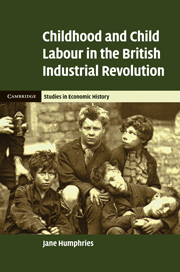10 - Schooling
Published online by Cambridge University Press: 06 December 2010
Summary
Introduction
Schooling in this period has been a popular topic for historians. They have frequently sought evidence, indeed inspiration, from ordinary people's accounts. David Vincent's (1981) classic study of working-class perceptions of the economic and social changes of the period and Jonathan Rose's more recent (2001) evocation of working-class intellectual life both rely heavily on working-class autobiography (see also Burnett, 1982). This chapter could not possibly supplant these excellent studies. Fortunately, its focus is different. My interest is in the relationship between education, children's work and early industrialization. The first step is to extract quantitative evidence from the memoirs for comparison with data from more conventional sources. If autobiographers' exposure to schools was consistent with what is known for the population at large, then other evidence from these accounts can be used to fill gaps in the history of schooling, to answer questions about the motives for attending school, to explore its costs and benefits and to establish the quality of education. The larger aim is to develop the idea that forms of schooling that paid off relatively cheaply, primarily because they could be combined with early employment, contributed to the economic growth of the era.
A useful starting point is how eighteenth- and nineteenth-century schooling has featured in accounts of the industrial revolution. One problem is the nature of the evidence.
- Type
- Chapter
- Information
- Childhood and Child Labour in the British Industrial Revolution , pp. 306 - 365Publisher: Cambridge University PressPrint publication year: 2010

